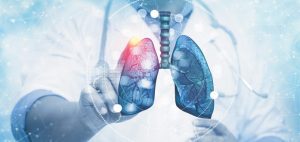 While the number of cases and the number of deaths from lung cancer have declined dramatically over the past decade, lung cancer is still the leading cause of cancer deaths in the United States in both men and women. According to the American Cancer Society, more people die of lung cancer in a year than from breast, prostate and colon cancer combined.
While the number of cases and the number of deaths from lung cancer have declined dramatically over the past decade, lung cancer is still the leading cause of cancer deaths in the United States in both men and women. According to the American Cancer Society, more people die of lung cancer in a year than from breast, prostate and colon cancer combined.
Risk Factors for Lung Cancer
Lung cancer forms in the tissues of the lungs, most often in the cells that line air passages, and occurs when these cells start to grow and multiply uncontrollably.
Approximately 85% of all lung cancers occur in people who smoke or who are exposed to secondhand smoke. Tobacco in all forms increases the risk of various types of cancer, and lung cancer in particular. The carcinogens in tobacco and tobacco products can potentially damage nearly every organ in the body.
Other risk factors include exposure to asbestos, nickel, arsenic, chromium or other chemicals, and some petroleum products, or living in an area with high levels of air pollution.
It is important to note that about 20% of lung cancer deaths occur in people who never smoked. Researchers are working to understand how and why this occurs. We do know that nonsmokers who develop lung cancers experience a different and unique set of genetic changes than smokers do.
An Ounce of Prevention . . .
There are ways to reduce your risk of lung cancer.
It stands to reason that one of the best ways to reduce your risk is to never begin smoking, or, if you do smoke, to stop as soon as possible. Many programs and community resources are available and can assist with smoking cessation. Discuss these and other options with your doctor to determine which method is best for you.
EARLY DETECTION SAVES LIVES
Although there have been many promising treatment advances, the average five-year survival rate for lung cancer in the U.S. is only 22%, unless it is detected early, according to the American Lung Association. If lung cancer is detected early, while it is still localized within the lungs, the five-year survival rate soars to 56%.
Unfortunately, only about 16% of all lung cancer cases are diagnosed at an early stage. Why? Because often there are no symptoms; a tumor may not be detected until it becomes very large.
Symptoms to be alert for include:
• Coughing up blood or a cough that doesn’t go away
• Recurrent episodes of pneumonia or bronchitis
• Wheezing or shortness of breath
• A high-pitched whistling-type sound when breathing in
or out, or a hoarseness to your voice
Because symptoms can be so vague, it’s important to pay close attention to any warning signs and contact your health care provider right away. If you are a current smoker or if you have ever been a heavy smoker for longer than 15 to 20 years, regular screenings are important.
Through the use of low-dose spiral computed tomography (CT) scans of the chest, lung cancer can often be detected in its early stages. This type of screening can detect early-stage cancers that cannot be seen on traditional chest X-rays. Check with your primary care physician to see if you could benefit from a CT lung scan.
The importance of early detection cannot be emphasized enough. If detected early, the chances of surviving lung cancer with a high quality of life are three times greater than when cancer is detected in a later stage.
IMPROVEMENTS IN THE TREATMENT OF LUNG CANCER
Many advances in the treatment of lung cancer have occurred in the past decade. These include the development of targeted therapies, medications that interfere with certain processes that cancer cells use to grow and spread, and immunotherapies, a type of targeted therapy that boosts the body’s immune system to fight cancer. These drugs have given oncologists many more options in treating lung cancer and have made treatment safer and more effective, with fewer side effects for patients.
Sometimes, chemotherapy is also used in combination with targeted therapies, and this protocol has been shown to improve survival rates. Clinical trials are looking at newer combinations of chemotherapy drugs to determine which are the most effective.
While there is still much research needed to develop even more effective treatments for lung cancer, the good news is that many more people are surviving the disease than ever before.
World-Class Cancer Treatment Close to Home
About Florida Cancer Specialists & Research Institute, LLC: (FLCancer.com)
Recognized by the American Society of Clinical Oncology with a national Clinical Trials Participation Award, Florida Cancer Specialists & Research Institute (FCS) offers patients access to more clinical trials than any private oncology practice in Florida. The majority of new cancer drugs recently approved for use in the U.S. were studied in clinical trials with FCS participation.* Trained in prestigious medical schools and research institutes, our physicians are consistently ranked nationally as Top Doctors by U.S. News & World Report.
Founded in 1984, FCS has built a national reputation for excellence that is reflected in exceptional and compassionate patient care, driven by innovative clinical research, cutting-edge technologies and advanced treatments, including targeted therapies, genomic-based treatment and immunotherapy. Our highest values are embodied by our outstanding team of highly trained and dedicated physicians, clinicians and staff.
Florida Cancer Specialists & Research Institute
For more information, visit FLCancer.com
Lake Worth Cancer Center
4801 S. Congress Avenue, Suite 400,
Lake Worth, FL 33461
Delray Beach
5130 West Linton Boulevard, Suite B-4
Delray Beach, FL 33434
Palm Beach Gardens
3401 PGA Blvd, Suite 200
Palm Beach Gardens, Florida 33410
Wellington North
1037 S State Road 7, Suite 303
Wellington, Florida 33414
West Palm Beach
1309 North Flagler Drive
West Palm Beach, Florida 33401
 South Florida Health and Wellness Magazine Health and Wellness Articles
South Florida Health and Wellness Magazine Health and Wellness Articles




